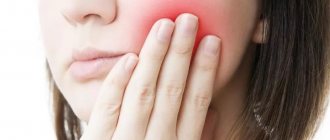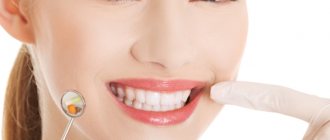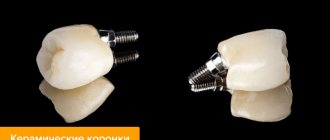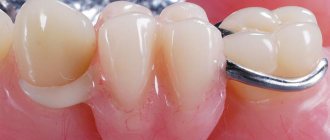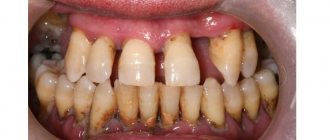Most people are not even aware that they have bad breath. Due to the structural features of the human nasopharynx and oral cavity, it is almost impossible to independently assess the freshness of breath. Since a person cannot smell his breath, its freshness can only be assessed by the reaction of others.
Bad breath can have one or more causes. It is important to determine whether bad breath is your constant companion or a temporary phenomenon.
The cause of temporary bad breath may be the consumption of certain foods. Usually, exotic spicy dishes, fatty sauces, onions, garlic, etc. have a negative effect on breathing. Thus, you can get rid of the smell simply by brushing your teeth. By performing regular oral hygiene after meals, you can completely eliminate the possibility of an unpleasant odor. If the appearance of bad breath is not associated with food consumption, there are several main reasons for its occurrence.
Myth 1. Veneers are installed in one day
Restoration using veneers requires at least two visits to the dentist.
At the first appointment , the doctor examines the dental cavity, determines whether this restoration method is suitable for the patient, and makes impressions of the teeth.
Using these impressions, technicians make onlays, and the dentist installs and fixes them on the patient’s teeth during the second visit.
In some clinics, the process takes three visits, because at the second visit the doctor grinds down the teeth and temporarily installs plastic veneers.
Irrigator - an assistant in the fight against bad breath
A toothbrush and dental floss are, of course, good for maintaining oral hygiene. But there is a more effective remedy - an irrigator. It allows you to remove food debris with a directed jet of liquid and massage the gums, preventing periodontal disease. In addition, this device allows you to get rid of dry mouth, which can also cause an unpleasant odor.
A dental irrigator can be either stationary (for use at home) or mobile (for travel). The latter are especially good because you can take them with you on a trip, using them for timely cleaning of the oral cavity in any corner of the planet. Stationary models can be designed for all family members - the set includes an individual nozzle for each.
Using an irrigator allows you to clean hard-to-reach dental spaces, where bacteria usually multiply. Daily use of the irrigator in combination with other hygiene products will eliminate the unpleasant odor and help maintain a healthy smile for a long time.
Myth 2. Veneers fall off
If the tooth is properly prepared, nothing will fall off. Dentists without sufficient experience sometimes grind down more enamel than necessary, so it becomes problematic to securely fix the veneers. But in our VivaDent clinic all the doctors are experienced - they guarantee the quality of their work. Veneers will not break even if you eat apples, carrots and other hard vegetables and fruits.
Yes, at the end of the last century, when the technology first appeared, dental onlays were fragile - 3 out of 10 broke during the manufacturing process itself. And then this was considered the norm, but today, 30 years later, ceramics are used to make dental onlays, which are stronger than metal.
Patient education: myths about veneers
- Wearing veneers leads to tooth decay.
The risk of destruction of healthy teeth under veneers is reduced to a possible minimum: the veneers are sealed and protect the enamel from the penetration of bacteria, saliva and food debris. With proper preparation of teeth, veneers, on the contrary, protect teeth from caries.
- Veneers cause an unpleasant odor in the mouth.
The absolute tightness and tight fit of the veneers to the teeth prevents the penetration of bacteria, which are the source of bad breath. If such problems occur, the cause is most likely poor hygiene or caries in other teeth. Some people develop so-called gum pockets, where plaque and bacteria accumulate. But they can only be detected and cleaned through professional hygiene procedures. Wearing veneers and the formation of gum pockets have nothing to do with each other!
- Veneers create discomfort.
A slight discomfort, which is actually an addiction to microprostheses, is present for 1-2 days after installation. There may be a feeling that there is a heavy structure in the mouth, but this goes away very soon. In a similar way, addiction to fillings and dental crowns occurs.
- Veneers can replace missing teeth.
Despite all the benefits of veneers, they cannot replace missing teeth. Plates are used to correct gaps between teeth, dark enamel color and other defects, but the key point is that they are installed on the natural teeth present in the mouth.
- Veneers will last a lifetime.
Perhaps in a few decades, technology will move even further forward, and this will become a reality. With proper care and regular preventive visits to the dentist, veneers will last about 10-12 years.
- Because of veneers, taste sensations change.
Such situations occur if composite veneers are installed after incomplete polymerization: impurities are formed in the residual monomers of the microprosthesis, which affect the sense of taste. With professional installation of high-quality dental onlays, this is excluded!
- Teeth look unnatural.
The shade of veneers in most cases is lighter than the color of the enamel of your own teeth, but microprostheses will not be unnaturally white (unless this is the patient’s wish). First of all, the emphasis is on maximum naturalness, so that the teeth look natural and aesthetically pleasing.
- Installing veneers is very painful.
Some discomfort is present only when grinding tooth enamel. To eliminate any discomfort, the doctor administers local anesthesia.
Skeptical people consider veneers to be mere decoration and a waste of money. Whereas with the help of veneers you can correct the shape and position of teeth, improve color, prevent further carious destruction, and most importantly, get a Hollywood smile in a short period of time and with minimal invasiveness. To prevent any of the myths from becoming reality, it is important to approach the choice of a dental clinic with all seriousness!
Myth 3. Veneers destroy teeth.
Veneers are actually installed on previously ground teeth, just like metal-ceramic crowns. But the facts confirming their destructive effect are not enough to draw clear conclusions. Moreover, before installing ceramic plates, the dentist must examine the supporting teeth and make sure that there are no caries or other pathologies of the oral cavity. As a result, the likelihood of destruction of healthy teeth under veneers is reduced to zero, because they are sealed and protect the tooth from plaque and lactic acid. The development of caries is also prevented by the special cement with which veneers are fixed.
Causes of odor
The main reasons are:
- xerostomia – insufficient hydration of the oral mucosa;
- insufficient level of hygiene;
- inflammatory processes in the mouth.
In this case, the cause of the bad odor is considered to be bacteria and food fragments accumulated in the oral cavity. It is virtually impossible to combat this at home. This can only be cured in professional dental clinics.
Also reasons could be:
- ENT diseases:
- runny nose, sinusitis and sore throats;
- diseases of the stomach and intestines;
- endocrine system disorders;
- lung diseases;
- certain medications;
- long-term smoking;
- all kinds of diets.
Myth 4. Bacteria and unpleasant odor appear due to veneers
And in more detail: food debris accumulates in the holes between the teeth and onlays and creates a favorable environment for the development of bacteria, and also provokes bad breath.
This is all a myth, because tightness and tight fit of the lining to the tooth is one of the main conditions for the quality of the service.
In addition, veneers are made from ceramic and porcelain - materials that do not shrink. If there is any space left during work, it is only for fixing the veneers on the teeth with special dental cement.
Elimination
To keep your mouth clean, you need to brush your teeth twice a day and use dental floss and mouthwash after each meal. In a pinch, chewing gum will do.
Pay attention to your diet. Eliminate foods with strong odors, reduce the consumption of alcoholic beverages, and it is best to quit smoking completely.
During the rehabilitation period, special attention is paid to the gums. Both medications and folk remedies are suitable here.
Baking soda
It is useful to rub baking soda into the gums , to which you can add a little sea salt. This will improve blood circulation in the dental tissues, and therefore reduce their inflammation.
If you don’t want to rub anything into your gums, you can dissolve the same mixture in water and rinse your mouth with the resulting solution twice a day. For a glass of warm water, take 1 teaspoon of soda and salt.
Pharmaceutical chamomile
Prepare a decoction of chamomile.
- Pour 1 tablespoon of dried flowers into a glass of boiling water.
- Leave them for about an hour.
- Then strain the mixture and rinse your mouth a couple of times a day.
This will be an excellent prevention of inflammatory processes.
Oak bark
A decoction of oak bark can be used if swelling appears and the soft tissues become red.
- Pour 1 tablespoon of bark into two glasses of cold water.
- Place on high heat.
- After boiling, reduce the temperature and boil the mixture for a few more minutes.
- Then the broth should infuse for an hour under the lid.
Sage
Sage helps heal wounds, and Kalanchoe tincture can eliminate unpleasant odors due to its antiseptic properties.
- Young leaves of the plant must be filled with pure alcohol in a ratio of 10:1.
- Then put it in a dark place for a week.
To rinse the mouth, 1 teaspoon of the prepared mixture is diluted in 50 ml. water. The procedure must be carried out in the morning and evening.
Aloe tincture
For gum inflammation, aloe tincture is suitable. To prepare it:
- Freshly picked leaves of the plant are crushed into a pulp and placed in a fireproof pan.
- You need to wait until the plant releases juice, and then put the container on low heat and boil for 5 minutes. Add water if necessary.
- Cool the resulting broth and strain. There is no need to dilute it before using it for rinsing. Store this medicine in a glass jar and preferably in a cool place.
To prevent the development of bad breath, use preventive measures.
- Brush your teeth thoroughly - for 2-3 minutes.
- In addition to this, drink clean, still water regularly. Recommended consumption: 2 liters per day. Please note that this figure applies specifically to drinking water; other liquids will not be able to compensate for it. This volume of water will completely eliminate the risk of dehydration, which leads to decreased saliva production.
Oh, that smell...
The role of smells in our lives is difficult to overestimate. Many likes and dislikes arise under the influence of smell, although often we don’t even think about it. Bad breath can ruin a person’s life: they won’t hire him, they won’t want to continue getting to know him, colleagues will try to turn away or move further away during a conversation...
As a rule, the owner of bad breath himself does not feel it, he has long been accustomed to it, just as a “socialite” does not feel the perfume with which she is doused from head to toe. Bad breath is an alarm signal: something is wrong in the body. The cause of bad breath can vary from stomach disease to pathology of the ENT organs.
However, first of all, you should contact your dentist. Pay attention to the language. It is no coincidence that doctors call it the “mirror of the stomach.” A thick white or yellow coating indicates trouble in the digestive system and can itself be a source of a heavy odor. Consult a gastroenterologist, he will prescribe you a specific diet. He will advise you to brush not only your teeth, but also your tongue.
With chronic gastritis with low acidity, the digestion of protein substances slows down. Taking gastric juice and enzyme preparations recommended by your doctor will also help get rid of the smell. Bad breath is one of the symptoms of esophageal diverticulum (a pouch-like protrusion of the wall of the esophagus).
A sour odor is possible with peptic ulcers of the stomach and duodenum, accompanied by increased acidity of gastric contents. Specific odors should be alarming, for example, acetone in a diabetic coma, ammonia in the case of renal failure and kidney disease; putrefactive odor due to lung abscess or bronchiectasis (pus accumulates in the resulting pockets of the bronchi). Such odors are a reason to immediately consult a doctor.
As a rule, bad breath accompanies gum disease, the presence of dental plaque, and interdental pockets. Teeth affected by tooth decay can also cause bad breath. If only the patient, along with the doctor, felt the smell that spreads during the preparation of a carious tooth! Often the stench is so strong that the doctor is forced to change the protective mask many times. And if several teeth are affected by caries...
If a patient has so-called “pockets” - pathological depressions in the interdental spaces, then food debris usually gets stuck in them. It is almost impossible to remove them yourself, so the process of decay begins. It is accompanied by pain, inflammation and, naturally, odor. No amount of toothpaste will help here. It is necessary for the dentist to “clean out” everything from the pockets and provide treatment to promote their complete healing.
In the practice of dentists, there are often cases when just removing tartar is enough to make bad breath disappear. The fact is that tartar is saturated with pathogenic microorganisms, which not only cause inflammation of the gum tissue, but also smell very unpleasant. In cases where the smell is associated with diseases of the hard tissues of teeth or gum tissue, everything is solved quite simply: it is necessary to carry out sanitation, that is, complete improvement of the oral cavity, and the problem will be solved. All you need is the desire and patience of the patient.
However, there are situations when bad breath has a more complex cause. For example, with some diseases of the salivary glands, the required amount of saliva does not enter the oral cavity, or the saliva is too viscous. This leads to disruption of the self-cleaning processes of the oral cavity, which is accompanied by a bad odor.
“They smell bad” and many diseases of the mucous membrane. In these cases, only a doctor will give specific recommendations. Traditional medicine recommends eating rolled oats porridge in the morning if you have problems with salivation - it seems that rolled oats helps to increase the amount of saliva secreted. The aromas of alcoholic hangover, tobacco, eaten garlic and onions irritate others. Is it possible to somehow drown them out? Of course it is possible.
The most affordable home remedy against bad odor is raw apples. Eat them more often. Rinsing your mouth with an infusion of fresh dill is a good way to refresh your mouth. The garlic or onion spirit will disappear if these fragrant vegetables are eaten with parsley or celery root. Freshly brewed strong tea eliminates bad breath, including after wine, garlic and onions. For diseases of the oral mucosa, rinsing with infusions and decoctions of medicinal herbs has long been used in folk medicine.
Along with their anti-inflammatory effect, they have a good deodorizing effect. Use chamomile, sage, wild strawberry leaves, calendula, St. John's wort, and mint for these purposes. Usually the herb (separately or in a mixture of several types) is brewed at the rate of a tablespoon per glass of boiling water, infused, and squeezed. Half a glass of warm infusion is enough for one rinse. It is better to do this after eating and after you have removed all food debris with a toothpick and then with a toothbrush with paste or powder.
Germs and bad breath
The process of “air spoilage” in the oral cavity is directly carried out by different types of microbes, which, in the process of fermenting carbohydrates, produce sulfur compounds (hydrogen sulfide and others), which determine the bad oral odor. Particularly successful in this are anaerobic microorganisms that are located on the root of the tongue and in the depths of periodontal pockets or in the area of the transitional epithelium of the periodontal groove. The number of “oxygen-free dirty tricks” increases with poor oral hygiene and the presence of carious teeth, especially against the background of periodontitis. Anaerobes can also live in the pores of acrylic and nylon removable dentures. Thus, one of the significant reasons why your breath smells bad is poor hygiene of removable dentures.
Accordingly, high-quality removal of dental plaque, including in the subgingival area, along with cleaning of removable and fixed dentures can significantly reduce or completely eliminate unpleasant aromas from the oral cavity.
